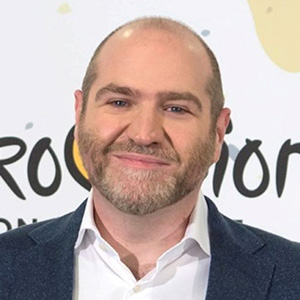Austria’s JJ wins 69th Eurovision Song Contest with ‘Wasted Love’
17 May 2025
Austrian artist JJ has won the 69th Eurovision Song Contest with the song ‘Wasted Love’.
This is Austrian broadcaster ORF’s first win since 2014 and third overall.
The winning song 'Wasted Love' secured 436 points.
In second place was Israeli broadcaster Kan’s song ‘New Day Will Rise’, performed by Yuval Raphael, who took 357 points.
Third place went to Tommy Cash for Estonian broadcaster ERR, whose song ‘Espresso Macchiato’ won 356 points.
A global audience United by Music
Twenty-six countries took part in the Grand Final of the world’s largest live music event, hosted by EBU Member SRG SSR on Saturday 17 May at the St. Jakobshalle in Basel, Switzerland.
After the performances, juries from the 37 competing nations revealed their votes, based on the dress rehearsal held the previous evening. JJ, whose real name is Johannes Pietsch, emerged as the jury leader.
Viewers’ televotes were then combined with jury scores, building to a dramatic finale in which ‘Wasted Love’ was declared the winner.
An estimated audience of more than 160 million people is expected to have watched this year’s Contest, which was broadcast live across all participating countries and online. Inside St. Jakobshalle, around 6,500 people watched the Grand Final live.
The world celebrates music, connection and inclusivity
Martin Green, Director of the Eurovision Song Contest, said: “Our congratulations go to ORF and to JJ, and we wish him every success as the Eurovision Song Contest provides a global springboard for his future career.”
“We’re immensely grateful to SRG SSR for their outstanding work in producing this year’s Contest and to the City of Basel and its citizens who have opened their hearts and streets to Europe and the world to create an unforgettable celebration of music and unity.”
SRG SSR Director General Susanne Wille said: “The Eurovision Song Contest fascinates millions around the world. At the same time, SRG benefits from the know-how and innovative ideas that help it continue fulfilling the unifying mission of a contemporary public media service. I am deeply grateful and proud of everything that has been created on, behind and beyond the grand stages of the ESC for so many people. We have succeeded in transforming a massive television show into an even greater societal event — proudly Made in Switzerland.”
Co-Executive Producer Moritz Stadler said: “This year’s Eurovision Song Contest was about more than just three shows – it was about creating a sense of home. Whether you were in the arena, watching from a fan zone or tuning in from across the world, we wanted everyone to feel part of something bigger. That sense of connection, of joy, of being United by Music – that’s what will stay with us long after the lights go down.”
Co-Executive Producer Reto Peritz added: “Standing backstage and seeing it all come together, the lights, the artists, the energy in the arena, was incredibly moving. As someone who has lived and breathed this Contest for years, bringing it home to Switzerland and delivering it on this scale has been an incredible experience. It’s not just about the production, it’s about the feeling we’ve created, one that will stay with people long after the show ends. That, to me, is the true impact of the Eurovision Song Contest.”
Listed in the order in which they appeared, the Grand Final line-up featured entries from:
- Norway (NRK)
- Luxembourg (RTL)
- Estonia (ERR)
- Israel (Kan)
- Lithuania (LRT)
- Spain (RTVE)
- Ukraine (Suspilne)
- UK (BBC)
- Austria (ORF)
- Iceland (RÚV)
- Latvia (LPSM)
- Netherlands (AVROTROS)
- Finland (Yle)
- Italy (Rai)
- Poland (TVP)
- Germany (NDR/ARD)
- Greece (ERT)
- Armenia (AMPTV)
- Switzerland (SRG SSR)
- Malta (PBS)
- Portugal (RTP)
- Denmark (DR)
- Sweden (SVT)
- France (France Télévisions)
- San Marino (San Marino RTV)
- Albania (RTSH)
Nemo returns to the Eurovision Song Contest stage
This year’s Grand Final opened with a performance by Nemo of last year’s winning song ‘The Code’ and a dynamic Flag Parade showcasing all 26 competing acts.
During the interval, Nemo returned to the stage to perform their new single ‘Unexplainable’, while Croatia’s Baby Lasagna and Finland’s Käärijä staged a playful battle performing their songs ‘Rim Tim Tagi Dim’ and ‘Cha Cha Cha’.
The show also paid homage to Switzerland's Eurovision Song Contest pedigree, with a tribute to its most cherished ESC performers and the Alpine nation’s participation over the years.
Public service media at the cutting edge of live broadcasting technology
The Eurovision Song Contest is one of the world’s most technically sophisticated live productions.
This year’s show included a stage whose floor included 200m² of LEDs, 750m² of vertical video LED wall, nine media servers, 4,500 lighting fixtures, 150 speakers and 2000m² of staging.
Between acts, an eight-strong stage management team and 30 crew had 42 seconds to reset the stage for the next act. Their movements are carefully choreographed and drilled, just like everything else in the show.
The 69th Eurovision Song Contest was hosted by the EBU’s Swiss Member SRG SSR following Nemo’s victory last year in Malmö, Sweden and saw 37 EBU Members take part.
For more on this year’s participants, including exclusive backstage content, visit www.eurovision.tv
Relevant links and documents
Contact

Dave Goodman
Communications Manager - Eurovision Song Contest and Junior Eurovision Song Contest






